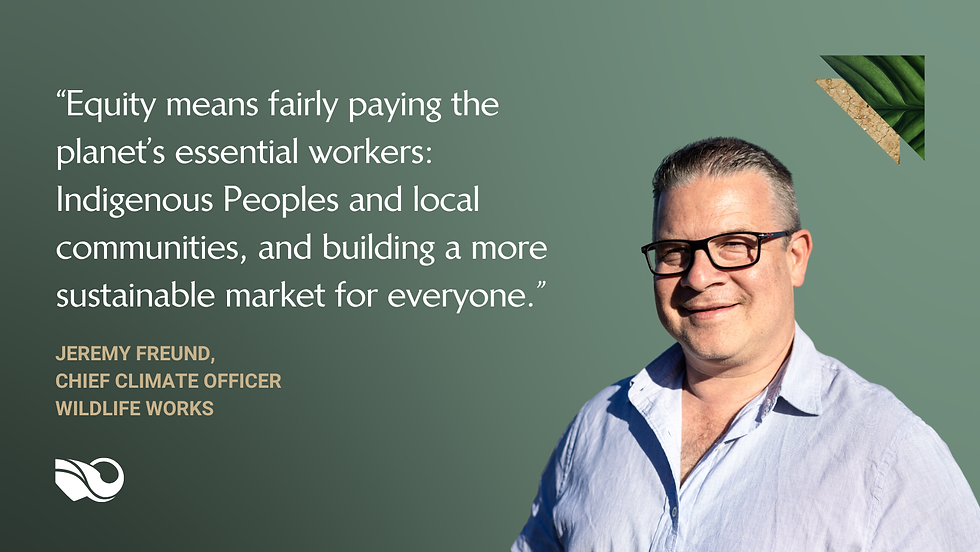Valuing the Priceless: October 2025
- Oct 20, 2025
- 3 min read

Since our founding in 1997, Wildlife Works has remained committed to our mission: making wildlife conservation work for local communities. The voluntary carbon market has been a key tool in scaling this vision globally.
As the market evolves, we’re expanding with innovations like Biodiversity Stewardship Units, ensuring communities continue to thrive while protecting critical ecosystems. Wildlife Works Founder Mike Korchinsky recently reminded our global team:
“We will not turn and run from these projects because of a technical challenge. We remain committed to our communities and will always work with them to find a solution, one way or another.”
Momentum in the Market
From United Nations negotiations to new corporate coalitions, October held several signals for greater accountability and ambition in the Voluntary Carbon Market (VCM).
This month, the heated debate over a United Nations standard detailing the permanence of carbon credits under Article 6.4 of the Paris Agreement reached a pivotal moment. In the standard's original form, nature-based climate solutions would have been effectively impossible to undertake due to unrealistic standards of "permanence." Ultimately, the Supervisory Body heeded the input of dozens of NGOs, private actors, and governments, who had called for revisions to the standard. This is good news not only for the future of nature-based projects under Article 6, but also within the voluntary carbon market, where Article 6 rules have a growing influence. Technical decisions around permanence remain, but will now be made at the methodological level.
As noted by Gabriel Labbate and Ruben Lubowski in Carbon Pulse, we must abandon false dichotomies and view permanence as a spectrum. They argue that storing carbon now creates immediate climate value by slowing warming and protecting natural systems, and that limiting Article 6 participation to projects only with “permanent” carbon storage was a riskier policy that would have hindered progress. Conservation International led a powerful open letter on this topic. The Supervisory Body members' decision clearly indicates that public input of this kind was decisive in the adoption of a standard that is inclusive of forest projects, communities and governments.
Other key VCM updates include the creation of the Task Force for Corporate Action Transparency, a monumental step in improving how companies measure and report their climate action. The newly created Verified Carbon Market (VCM+) Coalition, which unites 50+ leading organizations, aims to mobilize $100 billion to avoid or remove 5 billion tons of CO₂e by 2035, signaling strengthening market demand and integrity.
Climate Week Recap
At Climate Week NYC, our founder Mike Korchinsky joined Chief Tashka and Laura Yawanawa, co-creators of our Biodiversity Stewardship Units, and sustainability leader Helen Crowley for a powerful dialogue moderated by Giulia Carbone of the Natural Climate Solutions Alliance. The conversation which transpired offered a rare and piercing convergence of Indigenous perspectives with the global economic system. From the Yawanawa’s story of cultural revival to Helen Crowley’s business case for a nature-positive economy, the discussion underscored one truth: protecting biodiversity is inseparable from protecting humanity's future.

Our Chief Climate Officer Jeremy Freund spoke on a panel about one of the most urgent challenges of our time: bringing equity into climate finance. The conversation, hosted by Chloris, was a powerful reminder that despite all the talk about carbon, climate action is ultimately about people. The structures that make up the carbon market must value the contributions of Indigenous peoples and local communities, who are the planet’s essential workers, safeguarding forests and ecosystems that benefit us all.

The path forward is clear: if we want scalable, credible, and just climate solutions, equity must be built into the foundation of climate finance.
PODCAST LAUNCH

We’re excited to introduce our new AI-powered podcast series:
🎧 Botsplaining: The Climate Edit — turning complex climate topics into accessible, engaging conversations.
While the voices are AI-generated, the insights are grounded in decades of Wildlife Works’ conservation experience, carefully prompted and reviewed by our team.
Episode 1: “From Trees to Truth” explores next-generation carbon monitoring and how REDD+ may have overlooked degradation—the missing piece in forest protection.
Subscribe to our Email Newsletter
Want to receive this newsletter directly to your email inbox?
